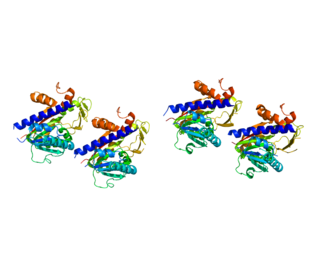| tRNA (guanine-N7-)-methyltransferase | |||||||||
|---|---|---|---|---|---|---|---|---|---|
| Identifiers | |||||||||
| EC no. | 2.1.1.33 | ||||||||
| CAS no. | 37257-00-4 | ||||||||
| Databases | |||||||||
| IntEnz | IntEnz view | ||||||||
| BRENDA | BRENDA entry | ||||||||
| ExPASy | NiceZyme view | ||||||||
| KEGG | KEGG entry | ||||||||
| MetaCyc | metabolic pathway | ||||||||
| PRIAM | profile | ||||||||
| PDB structures | RCSB PDB PDBe PDBsum | ||||||||
| Gene Ontology | AmiGO / QuickGO | ||||||||
| |||||||||
In enzymology, a tRNA (guanine-N7-)-methyltransferase (EC 2.1.1.33) is an enzyme that catalyzes the chemical reaction
- S-adenosyl-L-methionine + tRNA S-adenosyl-L-homocysteine + tRNA containing N7-methylguanine
Thus, the two substrates of this enzyme are S-adenosyl methionine and tRNA, whereas its two products are S-adenosylhomocysteine and tRNA containing N7-methylguanine.
This enzyme belongs to the family of transferases, specifically those transferring one-carbon group methyltransferases. The systematic name of this enzyme class is S-adenosyl-L-methionine:tRNA (guanine-N7-)-methyltransferase. Other names in common use include transfer ribonucleate guanine 7-methyltransferase, 7-methylguanine transfer ribonucleate methylase, tRNA guanine 7-methyltransferase, N7-methylguanine methylase, and S-adenosyl-L-methionine:tRNA (guanine-7-N-)-methyltransferase.


